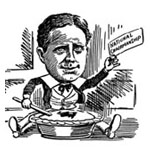
From Butchered English To Butchered Theology
Over the years in the NOR there’s been a good deal of criticism directed at so-called inclusive language. It’s been pointed out in these pages that standard generic English has always been perfectly intelligible to everyone, both male and female. Thus, for example, everyone has known that a “chairman” can be a female, according to the venerable linguistic principle that “man embraces woman.”
Consider the signs on certain beaches saying “Beware: Man-Eating Sharks.” No female, not even the most rigid feminist, would run into the waves on the assumption that the sharks only attack males. Nevertheless, signs are now no doubt being made saying: “Beware: Person-Eating Sharks,” due to feminist claims that “Man-Eating” excludes females — which of course it doesn’t, for “Man-Eating,” being generic, is inclusive. The way things are going, soon we’ll be expected to refer to the Gerperson language instead of the German language.
No, we’re not being far-fetched. After all, “inclusive” language has already been extended to Heaven. Feminists claim that to refer to God as “He” or “Father” (as Jesus did) makes women feel excluded, inferior — that when God is understood as masculine, then all males are gods. And so we’re hearing more and more references to “God our Father/Mother” and “God our Parent,” etc. — as feminists presume to correct Jesus, who, if He was the preexistent Son of God as He claimed to be, was in a position to know for sure.
But there’s more than heresy involved in the “inclusive”-language agenda; there’s subtle apostasy. David Mills points out in Touchstone (April) that the structure of generic English (male embraces female) matches the very structure of Christianity: “A Christian cannot argue that the male cannot include…the female, for that claim destroys…the Atonement.” Bingo! Christ, a male, died for the sins of both males and females. If one insists that male cannot embrace female, then Christ’s Atonement was for males only, therefore it was radically defective, and therefore the credibility of Christianity as such collapses.
You May Also Enjoy
Where do we stand in relation to George Washington’s claim that godlessness leads to immorality, and immorality to a breakdown in democratic governance?
Is inclusive language a reality of current English, or merely a contrivance?
Zondervan, publisher of the NIV, planned a so-called inclusive-language version of the NIV that would eventually replace it, but was pressured to stop.

